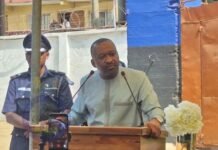By Foday Moriba Conteh
In a bid to strengthen climate action efforts in the Western Area Rural and Pujehun District in the country, the Women’s Network for Environmental Sustainability (WoNES), a leading environmental NGO in Sierra Leone ,in partnership with Christian Aid Sierra Leone, has on Thursday 12th September, 2024 concluded a two-day Climate Change Advocacy and Policy Dialogue Workshop. The event, which brought together policymakers, environmental NGOs, community leaders, the media and private sector representatives was held at the Family Kingdom Resort on Aberdeen in Freetown.
In her address, the National Coordinator, Women’s Network for Environmental Sustainability (WoNES), Gertrude Karimu, said that the workshop which focused on empowering stakeholders with advocacy skills and enhancing understanding of policies to combat the adverse impacts of climate change in Sierra Leone is part of its Climate Change Adaptation and Sustainable Energy (CCASE) project.
She added that the workshop emphasized the urgent need for comprehensive and coordinated climate action due to the increasing threats posed by climate change, including extreme weather events and rising sea levels.
Gertrude Karimu, further informed the gathering that the workshop include enhanced knowledge on climate change, stronger advocacy groups in local communities and the formation of networks committed to advancing climate action, adding that at the end of the workshop participants left with a deeper understanding of climate change challenges and strategies, better equipped to advocate for sustainable solutions in their communities.
John D. Brima, Assistant Director, Forest Research and Extension at the Ministry of Environment and Climate commended the Women’s Network for Environmental Sustainability (WoNES) for organizing the two-day Climate Change Advocacy and Policy Dialogue Workshop which he further described as very important towards addressing issues of climate change in the country.
He added that the move by the organization is complementing the work of the Ministry of which he said that the institution has been collaborating with the organization in several areas including training their farmers for adoption of mitigation climate change impacts in their pilot areas of interventions.
John D. Brima highlighted the need for robust action against climate change impacts in the country. He called on all to take climate change issues very serious adding that due to surveys conducted there have been projections that if action is not taken in terms of restoration against illegal sand mining the water will take over the land especially at Aberdeen Community and other areas close to the sea.
On his part, Dr. Mustapha O. Thomas from the Geology Department, Fourah Bay College, University of Sierra Leone, started by highlighting that the organization, through the project, has engaged residents in the project pilot areas geared towards educating them on the project and what will be their contributions as well as putting together climate change action in order to address issues of climate change in their communities and the country as a whole.
He said that climate change is one of the greatest threats to food security, energy and water resources in the country, adding that Sierra Leone is also named among the most vulnerable countries to the impact of climate change.
Dr. Mustapha O. Thomas said that there is also a need to use Government’s policies for more advocacies on climate change adding that through the project there was a baseline study conducted on the current situation on the ground of which he pointed out that after the study a policy brief was developed which he said will be distributed to policy makers in the country.
Through presentations from the Environmental Protection Agency, Presidential Initiative on Climate Change, Renewable Energy and Food Security, Christian Aid, etc. during breakout and interactive sessions participants discussed climate change impacts, national policies and strategies for implementing the National Adaptation Plan (NAP). The sessions provided tools for effective advocacy, stakeholder engagement and policy influence.




